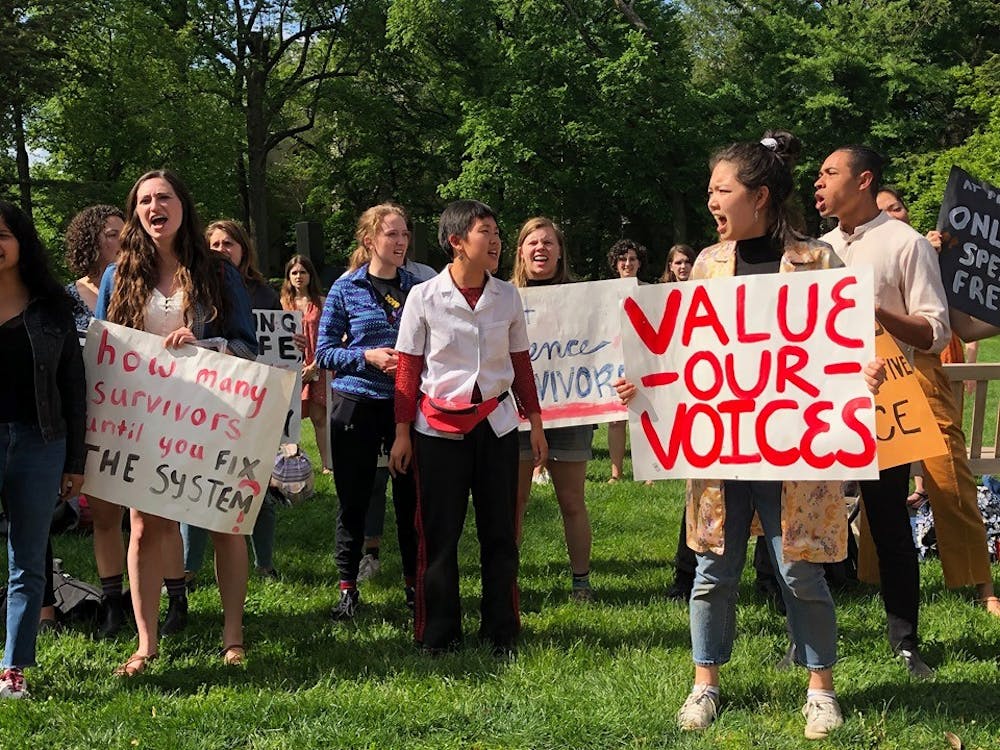In 2019, Princeton Students for Title IX Reform (PIXR) led a 200 hour long protest that called upon the University to address the culture of sexual misconduct on campus and reform its unethical implementation of Title IX procedures and investigations. In the four years since the protest, the Princeton community has learned that we cannot rely on the University to ensure or provide opportunities for justice, healing, protection, or prevention. The lack of resolution as the protests ended, compounded by the University’s refusal to address the traumatizing and violating nature of Title IX proceedings, reflects its ongoing failure to confront systemic and cultural issues on campus that enable sexual misconduct to occur. We, the members of PIXR, continue to advocate for justice, safety, and healing for survivors of interpersonal violence and a paradigm shift in the campus culture that has brought about these harms.
To cultivate a campus that puts well-being and safety first, PIXR seeks to begin a new generation of work. With a growing membership of around 30 people at present – and new relationships with the Undergraduate Student Government, GSG, and graduate student groups – we hope to create survivor-centered community support programmes alongside our ongoing push for Title IX reform.
Survivors have brought numerous grievances to the attention of the University, which highlight unjust practices on the part of the Title IX office. These show repeated instances of survivors being disparaged and disrespected. Survivors have disclosed numerous instances showing the University’s negligence during and mismanagement of Title IX investigations to PIXR or the ‘Prince.’ Such examples include, but are not limited to: violations of FERPA and Princeton’s own regulations listed in Rights, Rules, Responsibilities; discarded and mis-aggregated evidence and testimony; penalizing survivors for not being able to remember details about their assault (despite the impact that trauma and intoxication have on memory); intimidating, invasive, and survivor-blaming questioning of survivors and witnesses; ignoring complaints of misconduct; dismissal of racist harassment that occurred alongside sexual misconduct; failure to provide adequate accommodations to survivors to enable them to continue their education at Princeton; granting assailants unnecessary rights of access to a survivor’s spaces on campus during decisions about No Contact Orders; failure to protect survivors from retaliation; and refusal to investigate assaults committed by graduating seniors.
The University does not want to address the fact that the Title IX office is operating disreputably under its nose, fearful of damaging its reputation and raising alarm bells to current and prospective families, alumni, and different stakeholders. While the Title IX office may not be able to comment on specific cases, based on its silence and survivors’ testimonies, it is unsatisfactory that they have made no effort to investigate, reform, or put a stop to the unjust practices flagged by survivors.
Following our protests, the University established the CPUC Ad Hoc Committee on Sexual Climate, Culture and Conduct (which replaced the Faculty-Student Committee on Sexual Misconduct). However, this body has done little to address the demands and recommendations that came from PIXR and the external and internal reviews of the Title IX process at Princeton in 2019 — the last time the process was externally reviewed.
The only changes that we have evidence of come from one update from the Office of Gender Equity and Title IX Administration from Oct. 2020 and two Sexual Harassment/Assault Advising, Resources and Education (SHARE) community reports published in 2019 and 2020, which outline shifts such as: one new SHARE clinician, a new four-year curriculum under development by SHARE, a new Global Safety and Security unit to provide information about resources to students affected by sexual misconduct while off-campus, and new websites to house more information about Title IX procedures and emergency funds available. They also hinted at a potential review of current misconduct training and a restorative practices working group, neither of which have resulted in any implemented changes, to our knowledge.
Unfortunately, however, the Ad Hoc Committee is not permanent, though we have made clear to the CPUC that it should be, and has failed to share a comprehensive report on their actions since 2020. In their December 2022 CPUC update, they skirted details on how they have allegedly addressed most of the reviews’ recommendations (15 out of 17, not specifying which), and seem to have undercounted the number of recommendations initially provided to them (we estimate there to be 35 distinct recommendations from the external review and 19 from the internal review).
Any improvements upon the state of the support systems for survivors in 2019 are welcome. However, the University has failed to address the root problems PIXR outlined from the beginning. There are no permanent bodies to guarantee ongoing student, faculty, or administrative oversight of issues related to sexual misconduct. The University has no grievance process for intersectional sexual violations (i.e. sexual misconduct that also includes racist, homophobic, and ableist violence), such as a process that can investigate reports that include violations of multiple Titles (as recommended by Title IX legal experts). There has been no improvement to sexual assault and Title IX training for University hires and student leaders. There has been little expansion of services for survivors of violence, nor diverse representation within those services. The University has made no effort to publicly maintain its commitment to protecting survivors’ rights as outlined in current Title IX policies in the face of national rollback efforts. The University must take steps to address these gaps in its handling of issues of sexual misconduct.

One of the first things that the Title IX office needs to do, as made clear by a recent investigation by the ‘Prince’, is reform the current Alternate Resolution Process. Established in 2020, this process is not an adequate alternative to the formal Title IX investigation as it fails to provide many survivors with sufficient support for their safety or wellbeing. Other universities, such as Brown University, Stanford University, University of Pennsylvania, Rutgers, Skidmore University, and The College of New Jersey, have been offering survivors restorative justice processes as an alternative to a formal investigation for years. Assisted by facilitators, participants discuss what harms occurred and ways to repair those harms.
The desired outcome is for the survivor to have ensured safety and wellbeing going forward and for the perpetrator to accept responsibility for and alleviate the harms they caused and change their behavior. In 2019, PIXR highlighted the desire of survivors for a restorative justice process to the University in our demands. In response, the University held its own working group to research restorative justice practices. Yet the current Alternate Resolution Process often leaves survivors feeling inadequately protected with their needs deprioritized, while perpetrators walk away having taken little responsibility for their actions.
In terms of providing additional support for survivors and campaigns to prevent sexual misconduct, SHARE represents an excellent opportunity, but has been severely underfunded by the University, as disclosed by SHARE staff to PIXR in 2019. SHARE needs an expanded budget so that they can increase staffing levels and programming in order to increase prevention efforts and therapeutic offers for survivors.
Further, the University needs to hire dedicated counselors to accompany and assist survivors with Title IX processes. Currently, the University therapists (from SHARE or CPS), residential college staff, and Title IX staff are not resourced or able to sufficiently support individuals through the case work involved in a Title IX proceeding. This leaves survivors to review and respond to Title IX case files and communications alone, which is emotionally draining, labor intensive, and challenging to accomplish as a non-Title IX expert, especially as they deal with being a student and recovering from trauma. The lawyers provided by the University are a useful legal aid, but they are only available during certain parts of the Title IX process and are not the solution to ensuring survivor wellbeing throughout.

Beyond PIXR’s calls for reform, we welcome the demands put forth in the recent ‘Prince’ article submitted by Hannah Reynolds and Jessica Lambert regarding the Title IX policy at Princeton, as well as articles from ‘Prince’ Editorial Board calling for increased support for survivors and changes to how faculty misconduct is addressed. We also support the recent call for the University’s Board of Trustees to engage with the campus community on issues such as Title IX reform.
PIXR is already preparing to address some of the issues that have been raised by survivors. We plan to work directly with University offices and departments to expand the accessibility of support and accommodations for survivors. For example, we aim to begin a conversation with faculty about proactively offering academic accommodations on their syllabi for people who have experienced interpersonal violence, regardless of whether or not they have reported it to the University. We also hope to increase awareness of the fact that even if survivors choose not to proceed with an investigation or resolution process, they can request that the Title IX office send a warning email to the person who has allegedly committed a Title IX violation. Moreover, we think that offering McGraw training for graduate student preceptors on how to support their students that are navigating a Title IX process is vitally important to ensuring that undergraduates feel safe and able to succeed in the classroom.
In addition to reforming campus practices, PIXR is also eager to create community support structures. We want to offer drop-in safe spaces and support groups for survivors on campus, letters of advice and support from survivor alums, events focused on healing from trauma, visiting speakers on restorative justice and healing, and communication campaigns on consent and appropriate behaviors. We plan to listen to student feedback as we prepare other programming. Our work is not limited to current students either. At Reunions this year, we will be hosting a drop-in safe space for survivors returning to campus where we can offer peer-to-peer support, share stories of healing, and imagine how Princeton could be a safer place together.
Yet, PIXR’s planned efforts are not enough to address the shortcomings of the University’s treatment of survivors or the pervasiveness of sexual misconduct on campus, both of which require an institutional response to fully support the Princeton community. The University has had four years to take decisive action on the sexual misconduct crisis that PIXR brought to its attention in 2019 – and that other students have highlighted to them repeatedly since.
There is only so much that students can do to protect themselves from harm and seek justice when they are wronged. It is up to the University to implement the change that Princeton so desperately needs in its approach toward community wellbeing in order to support students struggling with their health and safety, empower survivors in their healing journeys, and make campus feel safer for all.
Signed by Princeton Students for Title IX Reform (PIXR), written by Tori Gorton ‘21.
Tori Gorton is a co-founder of Princeton Students for Title IX Reform (PIXR) and an alum of the Class of 2021 from the UK. She can be reached at princetonixnow@gmail.com.








